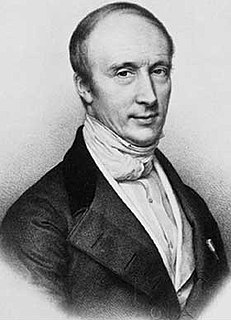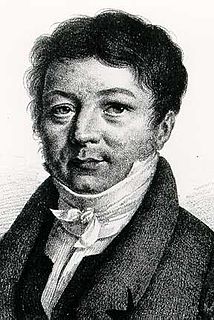A Quote by Thomas Huxley
It seems safe to look forward to the time when the conception of attractive and repulsive forces, having served its purpose as a useful piece of scientific scaffolding, will be replaced by the deduction of the phenomena known as attraction and repulsion, from the general laws of motion.
Related Quotes
All the forces that we see in nature, such as gravitation, attraction, and repulsion, or as thought, feeling, and nervous motion - all these various forces resolve into that Prana, and the vibration of the Prana ceases. In that state it remains until the beginning of the next cycle. Prana then begins to vibrate, and that vibration acts upon the Akasha, and all these forms are thrown out in regular succession.
While, on the one hand, the end of scientific investigation is the discovery of laws, on the other, science will have reached its highest goal when it shall have reduced ultimate laws to one or two, the necessity of which lies outside the sphere of our cognition. These ultimate laws-in the domain of physical science at least-will be the dynamical laws of the relations of matter to number, space, and time. The ultimate data will be number, matter, space, and time themselves. When these relations shall be known, all physical phenomena will be a branch of pure mathematics.
The endeavor of scientific research to see events in their more general connection in order to determine their laws, is a legitimate and useful occupation. Any protest against such efforts, in the name of freefom from restrictive conditions, would be fruitless if science did not naïvely identify the abstractions called rules and laws with the actually efficacious forces, and confuse the probability that B will follow A with the actual effort make B follow A.
The laws of thermodynamics may be regarded as particular cases of more general laws, applicable to all such states of matter as constitute Energy , or the capacity to perform work, which more general laws form the basis of the science of energetics, a science comprehending, as special branches, the theories of motion, heat, light , electricity , and all other physical phenomena.
Our design, not respecting arts, but philosophy, and our subject, not manual, but natural powers, we consider chiefly those things which relate to gravity, levity, elastic force, the resistance of fluids, and the like forces, whether attractive or impulsive; and therefore we offer this work as mathematical principles of philosophy; for all the difficulty of philosophy seems to consist in this from the phenomena of motions to investigate the forces of nature, and then from these forces to demonstrate the other phenomena.
A man and a woman are new to one another throughout a life-time, in the rhythm of marriage that matches the rhythm of the year. Sex is the balance of male and female in the universe, the attraction, the repulsion, the transit of neutrality, the new attraction, the repulsion, always different, always new.
Our present work sets forth mathematical principles of philosophy. For the basic problem of philosophy seems to be to discover the forces of nature from the phenomena of motions and then to demonstrate the other phenomena from these forces. It is to these ends that the general propositions in books 1 and 2 are directed, while in book 3 our explanation of the system of the world illustrates these propositions.
First, it is necessary to study the facts, to multiply the number of observations, and then later to search for formulas that connect them so as thus to discern the particular laws governing a certain class of phenomena. In general, it is not until after these particular laws have been established that one can expect to discover and articulate the more general laws that complete theories by bringing a multitude of apparently very diverse phenomena together under a single governing principle.
Love has been taken away from the poets, and has been brought within the domain of true science. It may prove to be one of the great cosmic elementary forces. When the atom of hydrogen draws the atom of chlorine towards it to form the perfected molecule of hydrochloric acid, the force which it exerts may be intrinsically similar to that which draws me to you. Attraction and repulsion appear to be the primary forces. This is attraction.
Minds vary in sensitiveness and in self-power, as bodies do in susceptibility of attraction and repulsion. When, when shall we learn that they are governed by laws as inexorable as physical laws, and that a man can as easily refuse to obey what has power over him as a steel atom can resist the magnet?
The truly scientific mind is altogether unafraid of the new, and while having no mercy for ideas which have served their turn or shown their uselessness, it will not grudge to any unfamiliar conception its moment of full and friendly attention, hoping to expand rather than to minimize what small core of usefulness it may happen to contain.
No one intuitively understands quantum mechanics because all of our experience involves a world of classical phenomena where, for example, a baseball thrown from pitcher to catcher seems to take just one path, the one described by Newton's laws of motion. Yet at a microscopic level, the universe behaves quite differently.
I know that certain minds would regard as audacious the idea of relating the laws which preside over the play of our organs to those laws which govern inanimate bodies; but, although novel, this truth is none the less incontestable. To hold that the phenomena of life are entirely distinct from the general phenomena of nature is to commit a grave error, it is to oppose the continued progress of science.




































